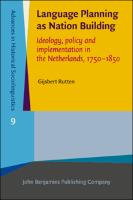Language Planning as Nation Building
Ideology, policy and implementation in the Netherlands, 1750–1850
Author(s)
Rutten, Gijsbert
Collection
Dutch Research Council (NWO); Dutch Research Council (NWO)Language
EnglishAbstract
The decades around 1800 constitute the seminal period of European nationalism. The linguistic corollary of this was the rise of standard language ideology, from Finland to Spain, and from Iceland to the Habsburg Empire. Amidst these international events, the case of Dutch in the Netherlands offers a unique example. After the rise of the ideology from the 1750s onwards, the new discourse of one language–one nation was swiftly transformed into concrete top-down policies aimed at the dissemination of the newly devised standard language across the entire population of the newly established Dutch nation-state. Thus, the Dutch case offers an exciting perspective on the concomitant rise of cultural nationalism, national language planning and standard language ideology.
This study offers a comprehensive yet detailed analysis of these phenomena by focussing on the ideology underpinning the new language policy, the institutionalisation of this ideology in metalinguistic discourse, the implementation of the policy in education, and the effects of the policy on actual language use.
Keywords
historical linguistics; history; German linguistics; sociolinguistics and dialectologyDOI
10.1075/ahs.9ISBN
9789027202406Publisher
John Benjamins Publishing CompanyPublisher website
https://benjamins.com/content/homePublication date and place
2019Grantor
Series
Advances in Historical Sociolinguistics (AHS), 9Classification
Linguistics
Sociolinguistics


 Download
Download